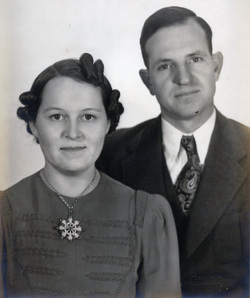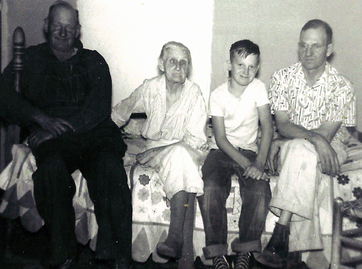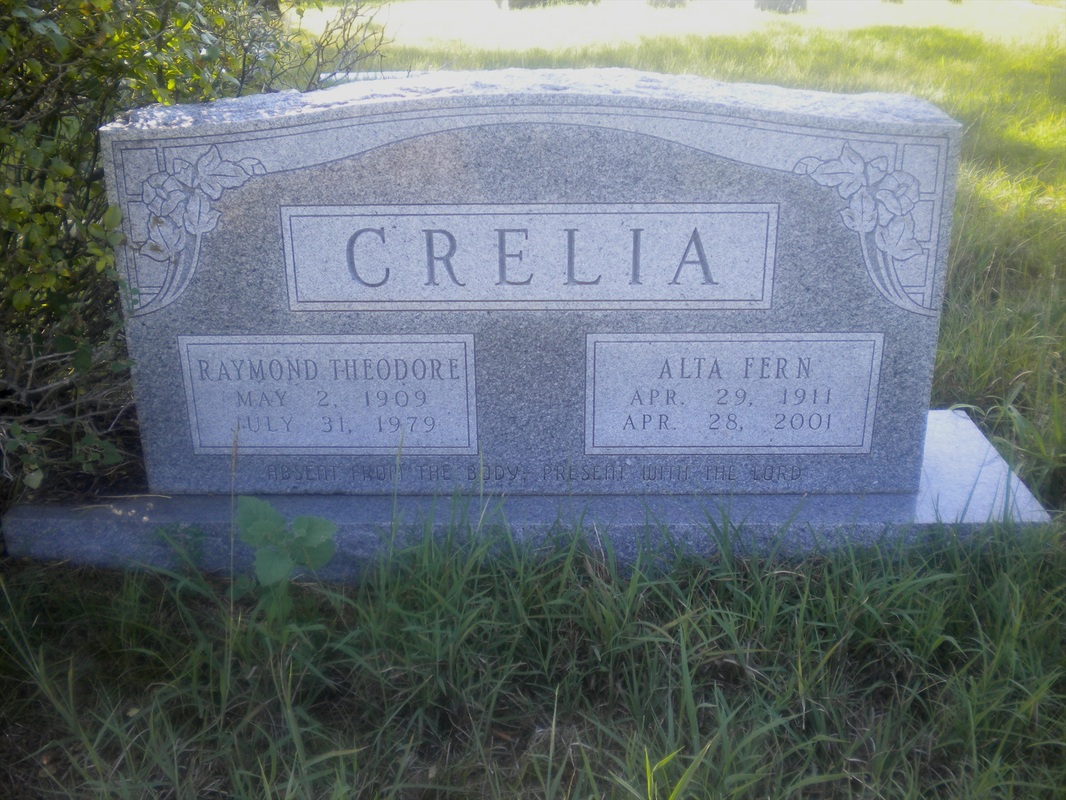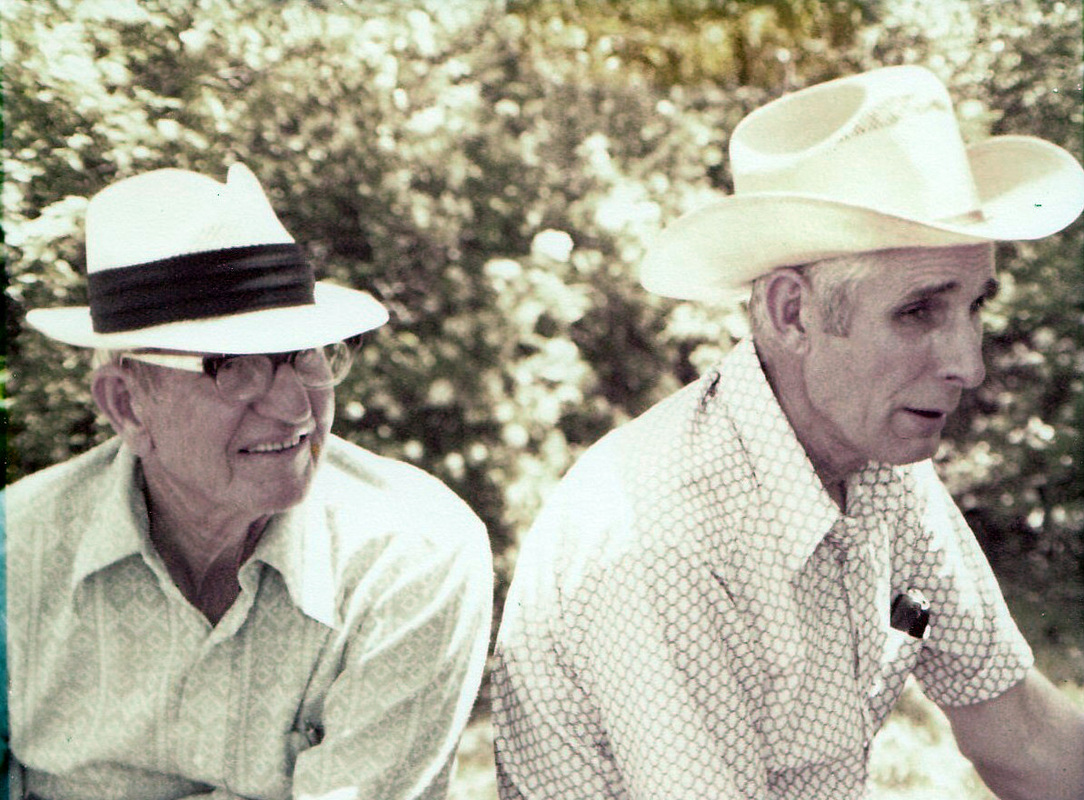RAYMOND THEODORE CRELIA
Birth: 2 May 1909
Death: 31 Jul 1979
(age 70 years, 2 months, 29 days)
 Alta Fern & Raymond Theodore Crelia
Alta Fern & Raymond Theodore Crelia
A Country Boy
My father, Raymond Theodore Crelia was the son of Isaac Denton Crelia and Sarah Elizabeth Clark. He was a classic example of the old adage: “you can take the boy out of the country, but you can’t take the country out of the boy.” He was assistant manager, then manager, of Kemble Brothers Furniture Store #2 in downtown Fort Worth for some 30 years. But Early American, Colonial or Modern was not what truly inspired him. He found it far more to his liking to raise some kind of farm animal or fowl. For many years as I was growing up, we had chickens in the barn behind our house. Daddy would buy newborn chicks from somewhere – I never asked – and raise them to maturity. He then sold them to a Mr. Hefley who came by the house and picked them up. What Mr. Hefley did with them I do not know. I didn’t ask about that either. We even had some laying hens for a few years and it was my job to peddle the eggs to the neighbors. My entrepreneurial experience came early in life. When the thrill of raising chickens finally wore off, Daddy embarked on a new venture – raising mink. Yep. This was the latest fad in the country as mink was selling very well to the fashion-minded and prices were going up and there was money to be made. Daddy became quite the authority on the care and feeding of these creatures. One bit of advice he gave me very strictly: do NOT stick your finger into the mink case. Fortunately, I followed his advice and still have all 10 digits. The mink did have nice fur but they were not known for their pleasant disposition.
My father, Raymond Theodore Crelia was the son of Isaac Denton Crelia and Sarah Elizabeth Clark. He was a classic example of the old adage: “you can take the boy out of the country, but you can’t take the country out of the boy.” He was assistant manager, then manager, of Kemble Brothers Furniture Store #2 in downtown Fort Worth for some 30 years. But Early American, Colonial or Modern was not what truly inspired him. He found it far more to his liking to raise some kind of farm animal or fowl. For many years as I was growing up, we had chickens in the barn behind our house. Daddy would buy newborn chicks from somewhere – I never asked – and raise them to maturity. He then sold them to a Mr. Hefley who came by the house and picked them up. What Mr. Hefley did with them I do not know. I didn’t ask about that either. We even had some laying hens for a few years and it was my job to peddle the eggs to the neighbors. My entrepreneurial experience came early in life. When the thrill of raising chickens finally wore off, Daddy embarked on a new venture – raising mink. Yep. This was the latest fad in the country as mink was selling very well to the fashion-minded and prices were going up and there was money to be made. Daddy became quite the authority on the care and feeding of these creatures. One bit of advice he gave me very strictly: do NOT stick your finger into the mink case. Fortunately, I followed his advice and still have all 10 digits. The mink did have nice fur but they were not known for their pleasant disposition.
 Elmer, Sara Elizabeth, Ray, & Raymond Theodore Crelia
Elmer, Sara Elizabeth, Ray, & Raymond Theodore Crelia
The aforementioned all took place at our house on 24th street on the north side of Fort Worth. When Daddy retired from Kemble Brothers in the early 1970s, he turned his attention to the Weatherford farm. His brother, my uncle Elmer, lived on the family farm and the two of them raised cattle. He built his own pens and feeding troughs for some 20 to 30 hogs. He would fatten them up for sale and hopefully end up with a profit. But I remember at least one occasion when he arrived at the pens to find a dead hog. All he could do was drag the carcass down the hill and let the scavengers have a feast. And losing a nice sized hog meant losing a substantial amount of the profit.
Maintaining his livestock in Weatherford required a 45 minute drive from Fort Worth, so Daddy put a lot of miles on his 1966 Ford pickup. He would make five or six trips a week to the farm. Sunday was church day with services morning and evening so he took that day off. When the old Ford had some 150,000 miles on it, he had the engine rebuilt. Then he and the truck had many more good years.
Such was the lifestyle for his “retirement” years – countless trips to Weatherford to see after his cattle and hogs. The farm and its environs gave him much satisfaction and pleasure. He was coming home – back to his roots. He was glad to be in the bucolic serenity of the farm with is open land, farm animals, trees, cool breezes, and waving grasses – all of them far from the maddening crowd. I suspect that in Heaven today, Daddy is still thinking: “Thank God I’m a country boy.”
Story written by Ray Crelia (son of Alta Fern and Raymond Theodore)
All photos courtesy of Ray Crelia (son of Alta Fern and Raymond Theodore)
Maintaining his livestock in Weatherford required a 45 minute drive from Fort Worth, so Daddy put a lot of miles on his 1966 Ford pickup. He would make five or six trips a week to the farm. Sunday was church day with services morning and evening so he took that day off. When the old Ford had some 150,000 miles on it, he had the engine rebuilt. Then he and the truck had many more good years.
Such was the lifestyle for his “retirement” years – countless trips to Weatherford to see after his cattle and hogs. The farm and its environs gave him much satisfaction and pleasure. He was coming home – back to his roots. He was glad to be in the bucolic serenity of the farm with is open land, farm animals, trees, cool breezes, and waving grasses – all of them far from the maddening crowd. I suspect that in Heaven today, Daddy is still thinking: “Thank God I’m a country boy.”
Story written by Ray Crelia (son of Alta Fern and Raymond Theodore)
All photos courtesy of Ray Crelia (son of Alta Fern and Raymond Theodore)
Ray Crelia and BIll Ralston
Photo taken in the mid 1970's at Clark Cemetery's annual meeting
Photo taken in the mid 1970's at Clark Cemetery's annual meeting

